
Evergreen vs. Deciduous: How to Choose the Right Trees for Year-Round Appeal
Published: 30/09/2025 | Updated: 18/12/2025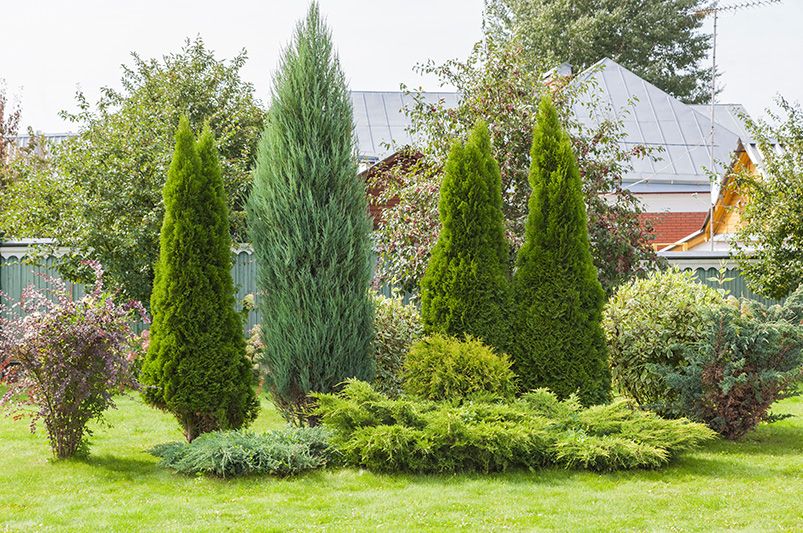
Adding trees to your yard is one of the most impactful choices you can make for your home’s beauty, energy efficiency, and property value. But the big question often arises: Should you choose evergreen trees or deciduous trees?


The answer depends on your landscape goals—whether you’re prioritizing year-round privacy trees, seasonal color, reduced maintenance, or energy savings. In this guide, we’ll compare the two types side by side, so you can make a confident decision that aligns with your home and environment.
Section 1: Understanding Evergreen vs. Deciduous Trees
Evergreen Trees: Consistent Green Year-Round
Evergreens, such as pine, spruce, cedar, and holly, retain their foliage all year. Their constant greenery ensures privacy and beauty during every season—including the bleakest winter months.
Key Evergreen Benefits:
-
Year-round privacy and wind protection
-
Continuous greenery for winter appeal
-
Consistent shade that can lower cooling costs
Example: The American Holly adds dense foliage for privacy and produces bright red berries in winter, offering ornamental interest when most plants lie dormant.
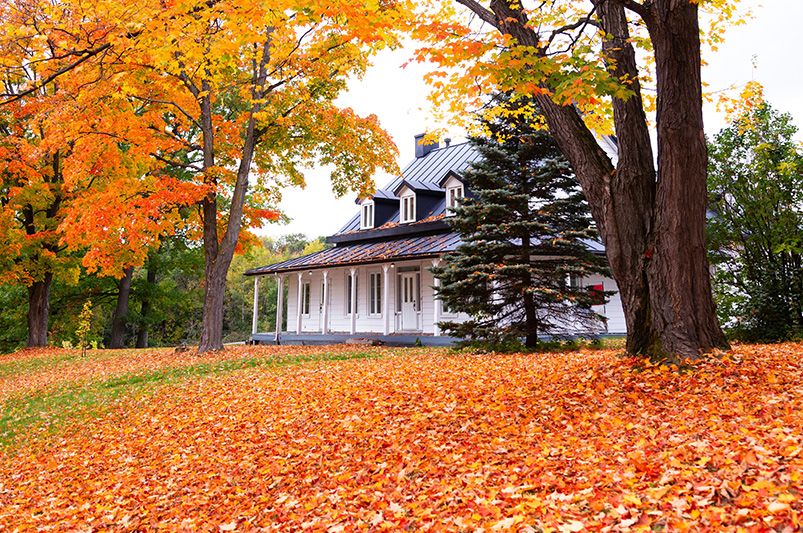
Deciduous Trees: A Dynamic Seasonal Journey
Deciduous trees, such as oak, maple, and sycamore, shed their leaves in fall and burst back in spring. They create vivid seasonal displays while also contributing to energy efficiency.
Key Deciduous Benefits:
-
Brilliant fall foliage and spring blooms
-
Dense summer shade reduces AC use
-
Bare winter branches let in warming sunlight
-
Natural soil enrichment from decomposing leaves
Example: The Silver Maple delivers a lush canopy in summer and fiery colors in autumn, offering dramatic seasonal appeal.
Section 2: Evergreen Trees — Pros, Cons, and Maintenance
Pros of Evergreen Trees
-
🌲 Privacy + Windbreaks: Excellent as natural barriers.
-
🌲 Low Cleanup Needs: Minimal leaf litter compared to deciduous.
-
🌲 Consistent Shade: Keeps outdoor spaces cool and usable.
Cons of Evergreen Trees
-
💧 Nutrient + Water Demands: Require steady resources throughout the year.
-
🎨 Limited Color Change: May lack the visual drama of seasonal shifts.
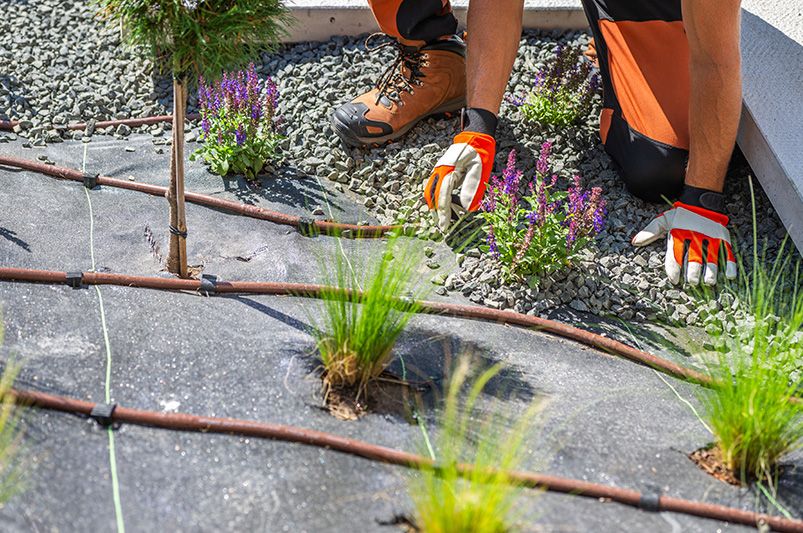
Evergreen Tree Maintenance Tips
-
Install drip irrigation to ensure steady, efficient watering.
-
Apply mulch to conserve soil moisture.
-
Prune sparingly to shape and maintain density.
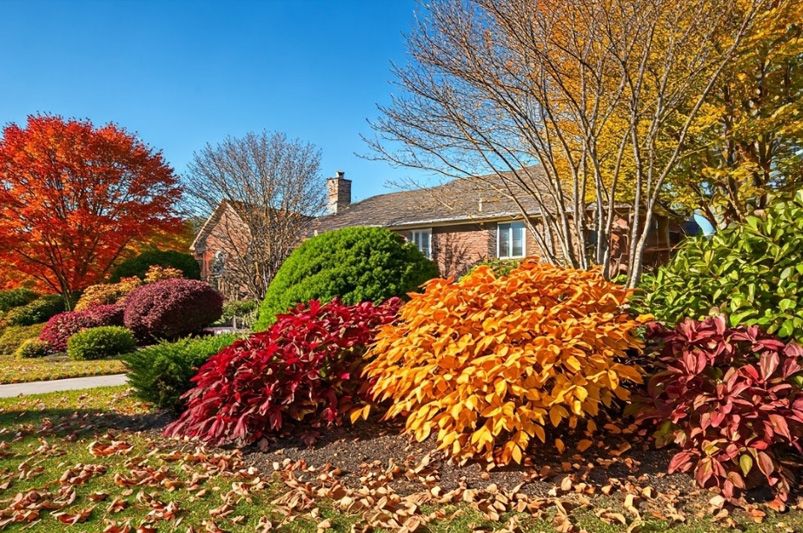
Section 3: Deciduous Trees — Pros, Cons, and Maintenance
Pros of Deciduous Trees
-
🍁 Seasonal Beauty: Dramatic spring, summer, and fall displays.
-
🍁 Energy Efficiency: Dense summer shade + winter solar gain.
-
🍁 Soil Health: Leaf litter enriches soil naturally.
Cons of Deciduous Trees
-
🍂 Seasonal Cleanup: Raking leaves in fall can be labor-intensive.
-
🌳 Winter Bare Branches: Reduced privacy during colder months.
Case Study: A homeowner in Vermont planted Sugar Maples alongside Eastern White Pines, achieving vibrant fall color plus reliable year-round screening.
Section 4: Matching Trees to Landscape Goals
Best Uses for Evergreens
-
Urban yards needing year-round privacy trees
-
Properties exposed to strong winds
-
Borders where constant greenery is desired
Scenario: A suburban garden planted with Thuja Green Giants creates a tall, low-maintenance privacy screen that blocks noise and maintains lush appeal year-round.
Best Uses for Deciduous Trees
-
Large yards where seasonal landscape design adds interest
-
Homes seeking energy efficiency (shade in summer, sunlight in winter)
-
Properties where wildlife and pollinators are welcome
Scenario: A Virginia homeowner planted Red Maples and Sycamores for stunning fall displays while letting winter light reach the home for warmth.
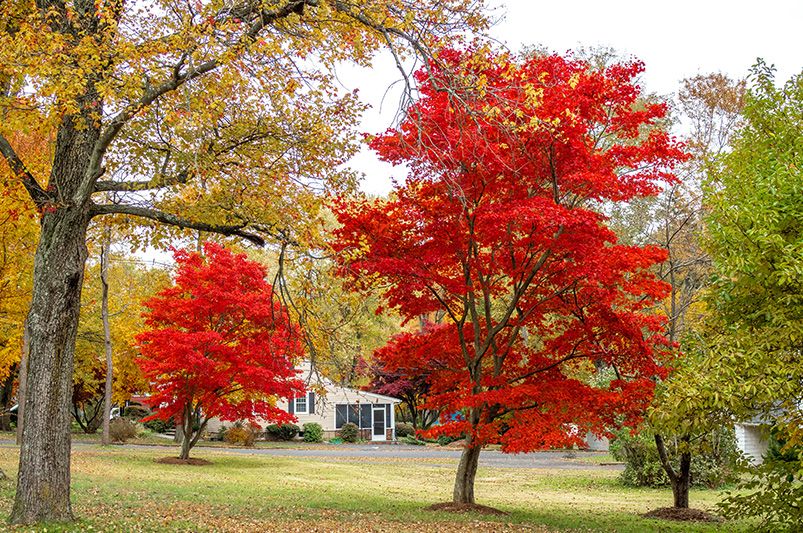
Section 5: The Power of Combining Both
For many homeowners, the ideal solution isn’t choosing one or the other—it’s blending both. Pairing evergreens and deciduous trees can give you:
-
Year-round privacy
-
Seasonal color changes
-
Balanced maintenance
-
Energy savings in both summer and winter
Think of evergreens as your reliable backbone, with deciduous trees providing visual drama and seasonal energy efficiency.
Conclusion: Trees That Elevate Your Landscape Year-Round
When choosing between evergreen and deciduous trees, think beyond appearances. Consider your priorities: privacy, shade, energy efficiency, or seasonal aesthetics.
-
Evergreens provide reliability and structure.
-
Deciduous trees deliver variety and vibrancy.
-
A mix of both ensures a landscape that works in every season.
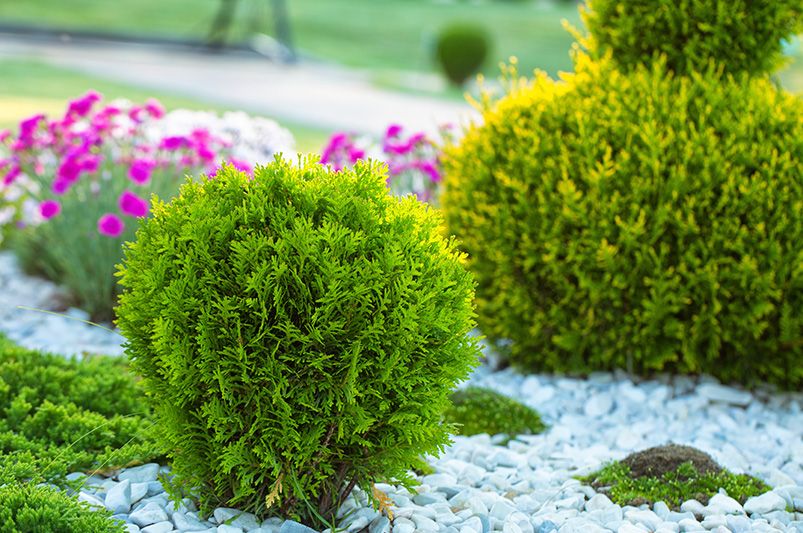
Ready to design your dream yard with the perfect balance of evergreens and deciduous trees?
ShrubHub’s expert landscape designers can create a personalized plan tailored to your climate, style, and goals.
Start your FREE ShrubHub 3D Landscape Design Today
Want a handy guide to reference while shopping for trees?
-
Pros and cons of both tree types
-
Maintenance checklists
-
Seasonal planting tips
-
A printable comparison chart
Download Your Free Tree Selection Guide Here
FAQs
Q1: What are the main benefits of evergreen trees?
A1: Evergreens provide year-round privacy, consistent greenery, and reliable shade, making them excellent for windbreaks and boundary planting.
Q2: Why should I consider deciduous trees?
A2: Deciduous trees offer seasonal beauty, summer cooling, winter sunlight access, and soil enrichment from fallen leaves.
Q3: Which tree type requires more maintenance?
A3: Deciduous trees typically require more seasonal cleanup due to leaf drop, while evergreens demand steady water and nutrient support.
Q4: Can I plant evergreens and deciduous trees together?
A4: Absolutely. Mixing them provides year-round coverage, energy efficiency, and seasonal variety.
Q5: Which is better for year-round privacy?
A5: Evergreens are best for privacy since they retain foliage year-round, unlike deciduous trees that shed leaves in winter.


